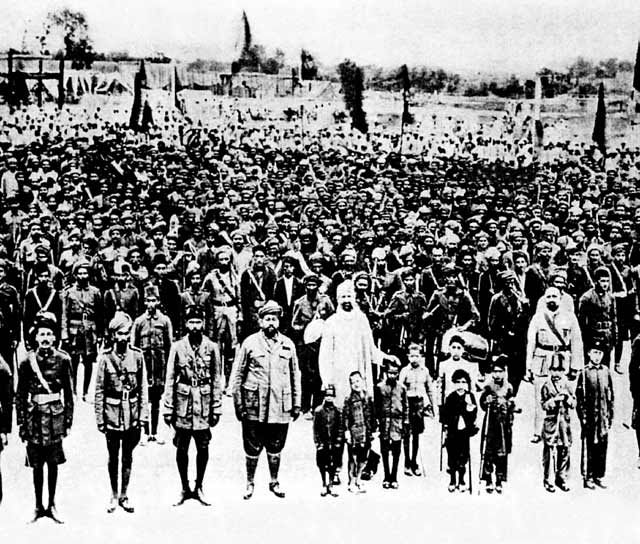Sandeep Pandey for BeyondHeadlines
It would seem improbable today but in the North West Frontier Province of Pakistan, which is centre of continued violence today dominated by Taliban, there existed an organisation dedicated to non-violence called Khudai Khidmatgar not very long back. The person who founded this was called Frontier Gandhi – Khand Abdul Gaffar Khan popularly known as Badshah Khan or Bacha Khan. The first organisation he founded was called Anjuman-e-Islah-e-Afghania which worked for education of Pathans or Pashtuns. Badshah Khan was not a politician. He was more of a social reformer. He believed in socialism. He worked for empowerment of women, peaceful resolution of feuds between community members known for their short temper, abolition of alcohol, etc. He started the first school in his own village Utmanzai. How difficult his work must have been can be imagined from the 2012 incident when a teenager activist Malala Yousafzai was shot at merely for advocating the right of girls to education. Malala also hails from the Pashtun community. What the Taliban did to Malala, the British did to Gaffar Khan much earlier as they banned his school.
Khan Abdul Gaffar Khan also played an active role in the freedom struggle against the British. For this reason the British were alarmed by his activities and arrested him several times. He was influenced by Mahatma Gandhi and became committed to his values of truth, non-violence and simplicity in his work.
Khan Abdul Gaffar Khan was one of the few prominent leaders in what is Pakistan today who opposed the partition. In fact, he felt let down by the Congress when it agreed to partition of the country. His loyalty to Pakistan remained under question. As a result he continued to spend time in jail even after independence. The second organisation that he founded in 1929 – Khudai Khidmatgar was banned by Pakistan, its members persecuted and even killed, its offices destroyed and the magazine Pakhtun brought out by Badshah Khan banned. Khan Abdul Gaffar Khan died on 20 January, 1988. Just before his death in 1987 the Indian government conferred Barat Ratna, its highest civilian honour, on him and he came to India to address a joint session of the parliament.
On the 23rd death anniversary of Badshah Khan, on 20 January, 2011, a Delhi based social activist Faisal Khan has revived Khudai Khidmatgar, in India. Considering how Malala was treated it is unlikely that this organization could have been revived where it originally functioned. Grand-daughter of Mahatma Gandhi, Tara Gandhi delivered oath to about 50 youth in Delhi who wore red uniform as the original brigade used to do. A number of youth from all over India, mostly Muslim, are enthusiastically joining the organisation as it gives them a platform to carry out social service. Like the mother organisation, the new version of Khudai Khidmatgar also engages in relief work at the time of natural or human created calamities, like communal riots and helps needy people in various ways.
Mostly young men and women are joining the group by taking an eleven point oath. By taking this oath they commit themselves to selfless human service, non-violence, simplicity, not to act with a feeling of revenge, oppose and promise not to indulge in any wrongful act. They prepare themselves for fearlessness and sacrifice. Today Khudai Khidmatgar has about five thousand members in Delhi, Punjab, Haryana, J&K, UP, Bihar, MP, Chhattisgarh, West Bengal, Assam, Maharashtra, Karnataka, AP and Telangana. The membership of original organization had crossed one lakh.
Khan Abdul Gaffar Khan’s grandson Asfandyar Wali Khan, leader of the Awami National Party in Pakistan was informed about the revival of Khudai Khidmatgar during one his trips to Delhi. He much appreciated the initiative.
The spirit is contagious. Camps are organised in different cities and villages and more youth come out to join this organisation. It is heartening to see youth who have received modern education willing to dedicate themselves for human service. The 100 strong national leaders’ council has 40 Hindus and 5 members from Shia community.
At a time when the communal atmosphere of the country is fast deteriorating with incidents like Muzaffarnagar and Moradabad, an organisation like Khudai Khidmatgar can play a very important role in preserving communal harmony, especially since it has both Hindus and Muslims as members. It can also provide an important platform where youth from different communities can work together for social causes but more importantly can learn about each other and develop a better understanding of the diversity of this country.
Khudai Khidmatgar has come as a breath of fresh air with its number of initiatives for communal harmony considering the worsening situation in the country. The political parties are interested in communal polarization of the country as it suits them in their vote bank politics. The latest incident is the forcible feeding of a muslim employee in Maharashtra Sadan in Delhi by several Shiv Sena MPs with the intention of breaking his fast during the month of Ramzan. Even though the Indian Constitution is committed to the value of secularism, it is quite clear that some political parties simply don’t care about it. They are spreading the poison of communalism, least bothered about its consequences.
It is only social initiatives like Khudai Khidmatgar which can neutralize this poison. It can remind people of the unfailing commitment of Mahatma Gandhi and Frontier Gandhi to peace and communal harmony. The bravery of these two great men in facing the communal forces should motivate the new band of Khudai Khidmatgars to accept the present challenge. The revival of this historic organization was the need of the hour.






















